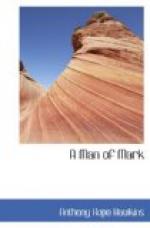CHAPTER I.
The movement and the man.
In the year 1884 the Republic of Aureataland was certainly not in a flourishing condition. Although most happily situated (it lies on the coast of South America, rather to the north—I mustn’t be more definite), and gifted with an extensive territory, nearly as big as Yorkshire, it had yet failed to make that material progress which had been hoped by its founders. It is true that the state was still in its infancy, being an offshoot from another and larger realm, and having obtained the boon of freedom and self-government only as recently as 1871, after a series of political convulsions of a violent character, which may be studied with advantage in the well-known history of “The Making of Aureataland,” by a learned professor of the Jeremiah P. Jecks University in the United States of America. This profound historian is, beyond all question, accurate in attributing the chief share in the national movement to the energy and ability of the first President of Aureataland, his Excellency, President Marcus W. Whittingham, a native of Virginia. Having enjoyed a personal friendship (not, unhappily, extended to public affairs) with that talented man, as will subsequently appear, I have great pleasure in publicly indorsing the professor’s eulogium. Not only did the President bring Aureataland into being, but he molded her whole constitution. “It was his genius” (as the professor observes with propriety) “which was fired with the idea of creating a truly modern state, instinct with the progressive spirit of the Anglo-Saxon race. It was his genius which cast aside the worn-out traditions of European dominion, and taught his fellow-citizens that they were, if not all by birth, yet one and all by adoption, the sons of freedom.” Any mistakes in the execution of this fine conception must be set down to the fact that the President’s great powers were rather the happy gift of nature than the result of culture. To this truth he was himself in no way blind, and he was accustomed to attribute his want of a liberal education to the social ruin brought upon his family by the American Civil War, and to the dislocation thereby produced in his studies. As the President was, when I had the honor of making his acquaintance in the year 1880, fifty years old if he was a day, this explanation hardly agrees with dates, unless it is to be supposed that the President was still pursuing his education when the war began, being then of the age of thirty-five, or thereabouts.




